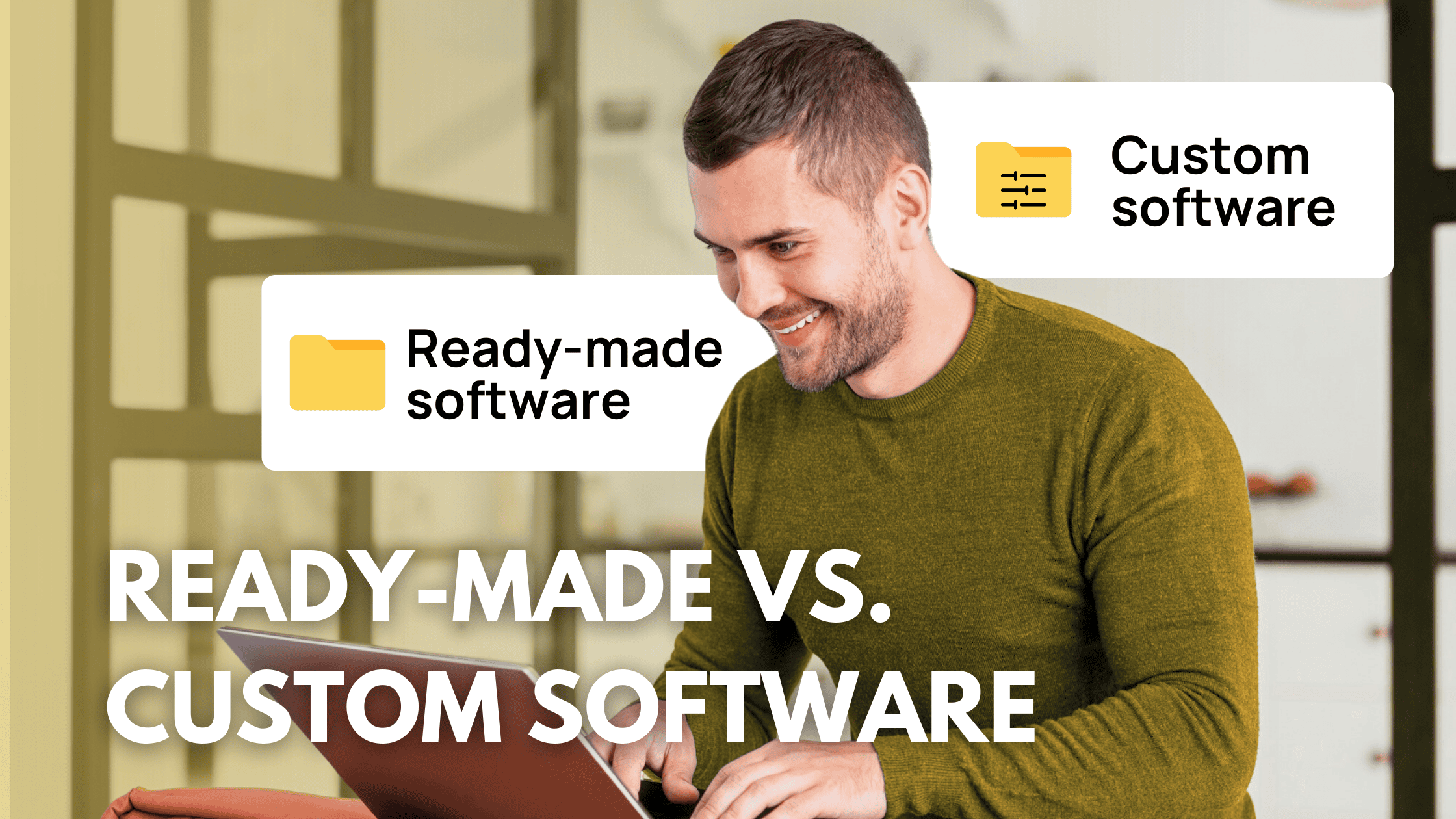The latest Economic Outlook from OCED projects global GDP growth of 3.3% in 2025 and the global economic remain resilient. (Source)
Technological innovation becomes increasingly critical for success in our dynamic business environment. The right technology solutions can make the difference between thriving forward and falling behind for a business.
When it comes to business software, you will face a crucial decision: choosing between ready-made and custom software. Each option presents unique advantages and challenges that can impact overall operational efficiency.
This comprehensive guide will walk you through everything you need to know about both options.
Let’s dive in!
Ready-made vs. custom software: What are they?
Business software is a technological ecosystem of computer programs designed to support and enhance organizational operations. These applications span a wide range of business functions, from resource planning to customer relationship management.
Business software can be broadly categorized into two distinct production types:
- Ready-made Software
- Custom Software
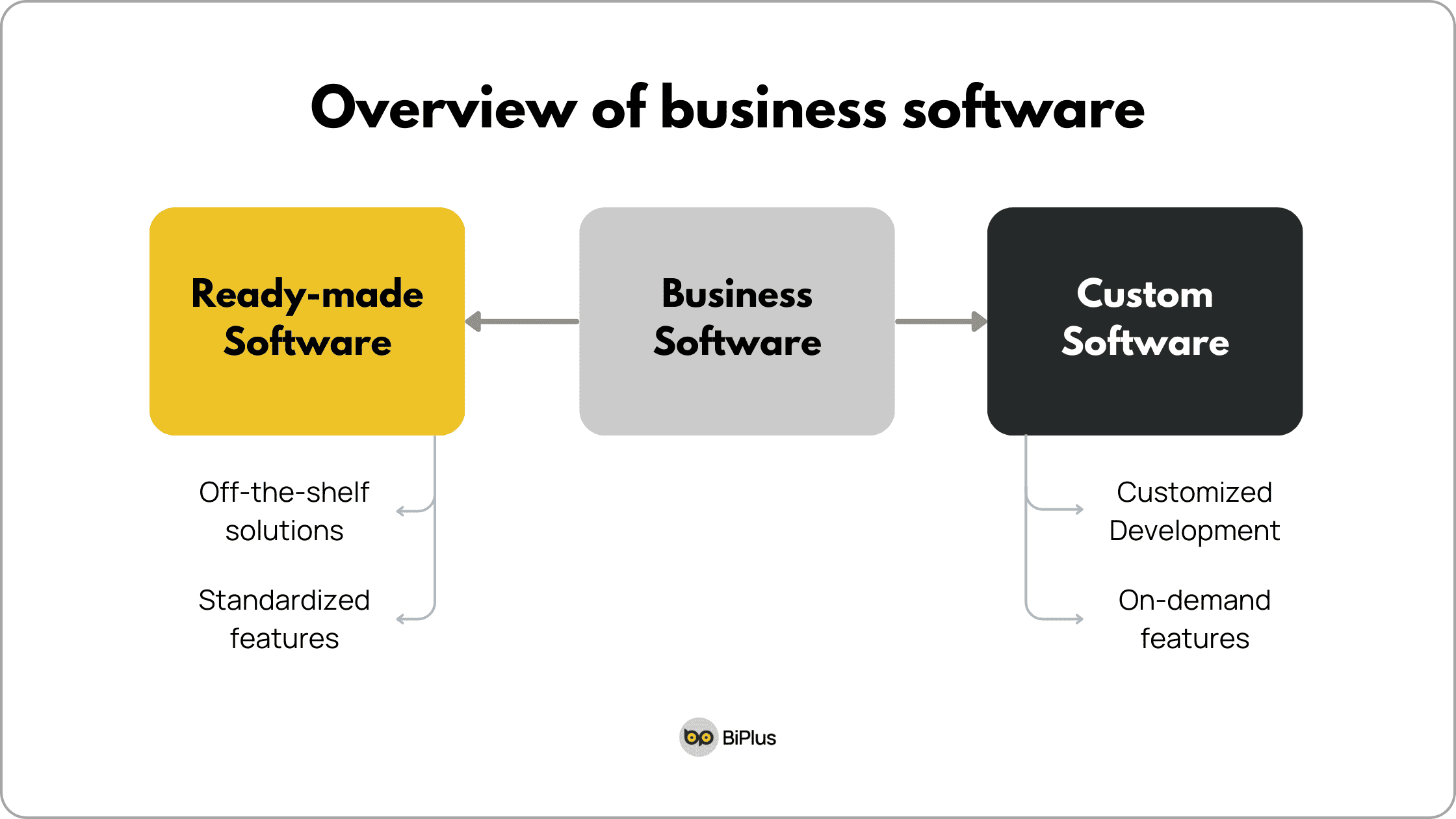
Ready-made Software
Ready-made software, commonly known as commercial software, presents pre-developed enterprise-level applications that address standard business functions.
What are key characteristics of ready-made software?
- Immediately purchasable and installable.
- Designed for broad, generalized usage.
- Limited to standard configuration options.
Typical examples of ready-made software
You may encounter ready-software in daily life, some typical software are:
- Microsoft Office
- Adobe
- Standard CRM platforms
- Accounting software like QuickBooks
Custom Software
Custom software provides a tailored solution specifically developed to meet unique requirements. Unlike ready-made alternatives, these applications are developed from scratch to align precisely with an organization's workflows and challenges.
What are key characteristics of custom software?
- Individually designed for specific business needs.
- Highly flexible and adaptable.
- Comprehensive integration with existing systems.
- Potential for competitive technological differentiation.
Some typical scenarios require custom software:
- Specialized enterprise resource planning systems.
- Industry-specific management applications.
- Proprietary workflow automation tools.
Ready-made vs. custom software: What’s the difference?
1. Framework
Framework for ready-made software
Ready-made software follows a one-size-fits-all approach, designed to serve a broad spectrum of businesses across different industries and scales. Its framework characteristics include:
- Uniform interface design.
- Standardized workflow processes.
- Generic functionality addressing common business needs.
- Limited flexibility for unique organizational requirements.
Organizations adopting ready-made software often face challenges when the software's predefined framework does not precisely align with their specific operational processes.
Framework for custom software
Custom software focuses on tailored solutions that precisely match individual business requirements. Its framework advantages include:
- Interfaces designed specifically for your brand.
- Workflows aligned with your unique business processes.
- Flexible architecture supporting future scalability.
- Seamless integration with existing systems.
2. Cost considerations
How ready-made software helps business save cost
Ready-made software presents a more economical initial investment due to its multi-user business model:
- Lower per-organization cost.
- Standardized pricing tiers.
- Predictable recurring subscription expenses.
Ready-made cost model allows business to:
- Reduce upfront development expenses.
- Allocate resources to others business activities.
Custom software can potentially generate higher return
Custom software requires a more comprehensive financial investment with higher initial development costs. Yet, as custom software can serve as a sustainable advantage, this investment can potentially generate higher return.
3. Software update mechanisms
Update approach for ready-made software
Ready-made software updates follow a standardized, provider-driven model:
- Periodic system and feature enhancements.
- Mandatory payment for version upgrades.
- Limited update frequency.
- Generic improvements targeting broad market needs.
Still, some characteristics in updated version of current ready-made software can misalignment with your specific business requirements, as the software itself has generic improvements for broad market needs.
Update approach for custom software
Meanwhile, custom software updates with a more flexible, business-centric approach:
- Updates responsive to specific organizational needs.
- Adaptable to evolving business processes.
- Directly aligned with company's technological strategy.
A flexible, business-centric approach for updating custom software enhances business considerably:
- Personalized enhancement roadmap.
- Immediate implementation of required changes.
- Continuous optimization of technological infrastructure.
- Greater control over update scope and timing.
Ready-made vs. custom software: How they are different
| Aspects | Ready-made software | Custom software |
|---|---|---|
Purpose | Execute and streamline standard business functions. | Perform business functions with specific method. |
Framework | Framework is designed for industry-wide and generalized usage. | Framework aligns precisely with organization's workflows and operational challenges. |
Cost considerations | Lower initial cost with standardized pricing tiers. | Higher investment cost, vary depends on the requirements from the business. |
Software update mechanisms | Standardized, provider-driven model. | Flexible, business-centric approach. |
Ready-made software vs. Custom software: Pros and Cons of each model
Ready-made software
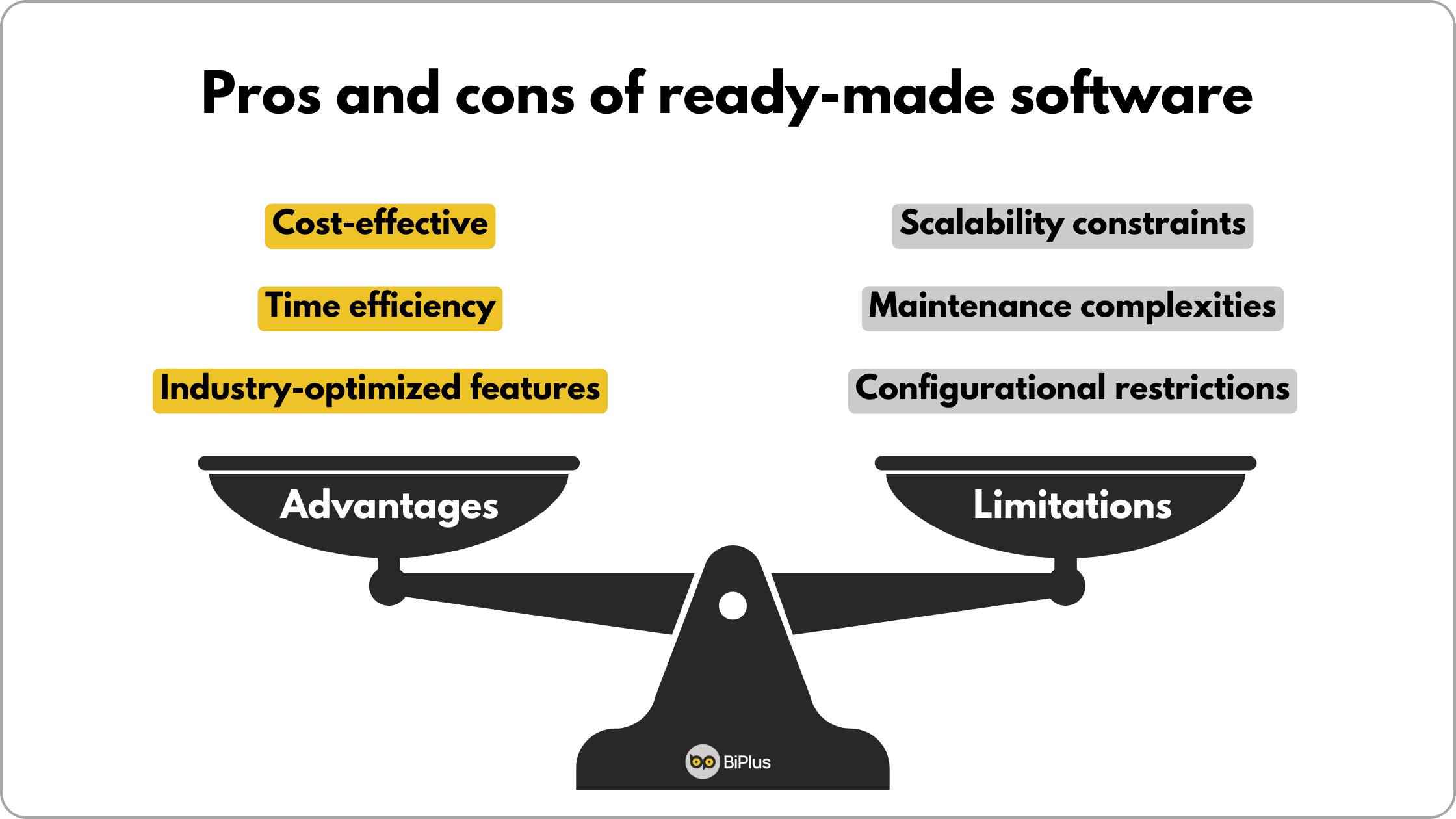
Advantages of Ready-made software
Time efficiency: Ready-made software is the most ideal solution for time-sensitive business needs, providing businesses with immediate operational readiness and simplified installation process.
Industry-optimized features: Developed by specialized industry experts, ready-made software brings operational advantages including:
- Comprehensive industry-specific feature sets.
- Professionally designed workflows.
- Standardized problem-solving approaches.
Cost-effective: Ready-made software provides flexible financial options such as diverse pricing tiers from competitive to premium, multiple feature-based options, and predictable licensing expenses.
Limitations of ready-made software
Configurational restrictions: Ready-made software has fixed, predetermined feature sets with minimal adaptability to unique organizational processes.
Maintenance and support complexities: Any technical issue for ready-made software relies on vendor support policies and responsiveness, requiring longer time for the issues to be fully adjusted.
Scalability constraints: Ready-made software has restricted capacity for organizational growth and functionality expansions. Also, business doesn’t have the control over updated version, leading to updated features potential misaligning with business needs.
Custom software
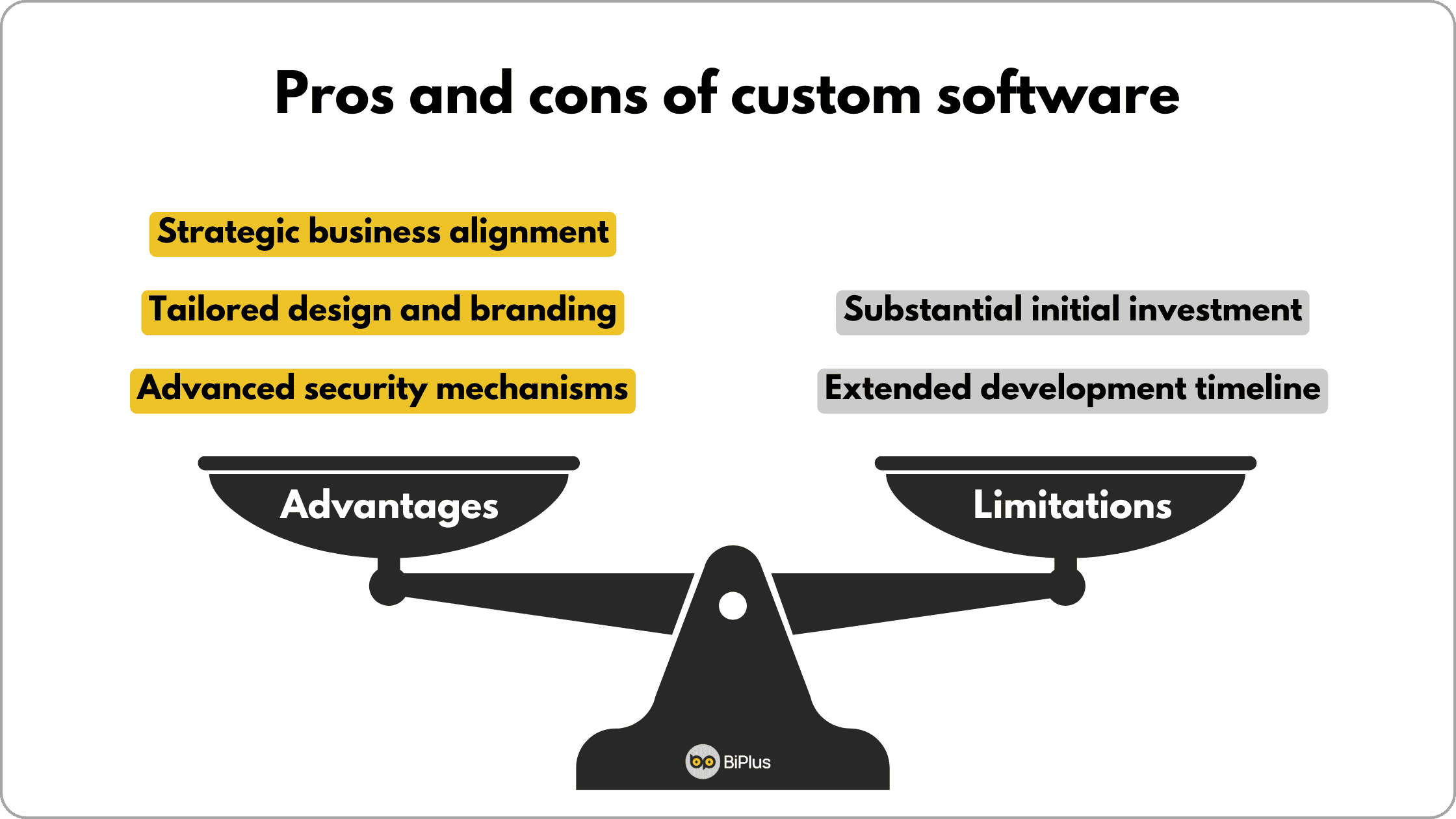
Advantages of custom software
Tailored design and branding: Custom software allows flexible design with fully customized user interface from graphic elements to typography and color palette that aligns with brand identity.
Strategic business alignment: Custom software can significantly enhance the operational efficiency:
- Addresses specific organizational challenges.
- Flexible architecture supporting current and future needs.
- Creates strategic asset evolving alongside the business.
Dedicated operational support: Custom software development usually comes with comprehensive technical assistance such as rapid problem-resolution mechanisms and direct communication with development team to minimize operational disruptions.
Advanced security mechanisms: Custom software offers superior security capabilities:
- Tailored security protocols.
- Unique safety feature integration.
- Compliance with specific organizational security requirements.
Limitations of Custom Software
Substantial initial investment: Custom software requires higher upfront development costs compared to the payment for ready-made ones. Still, the difference between these two options vary depends on the package of ready-made software and custom software complexity.
Extended development timeline: Custom software development takes a longer time than purchasing a pre-made option, as building a software requires multiple testing and adjustments before official launching.
Ready-made or custom software: Which is the best option for your business?
Business software represents a strategic investment that can dramatically transform organizational performance. Selecting the right software approach requires careful consideration of multiple critical factors.
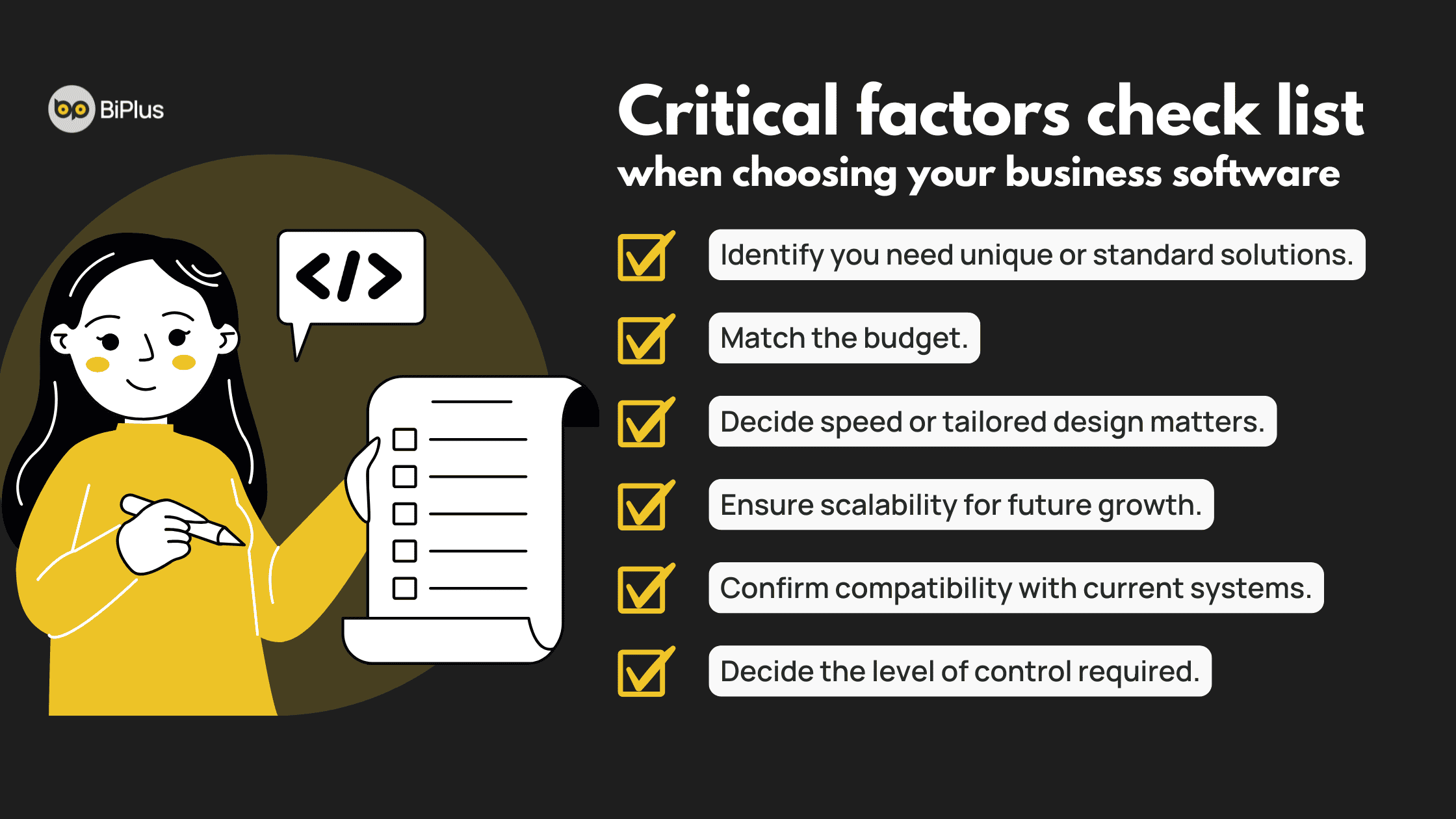
1. Specific needs and complexity
- Ready-made software: Best suited for businesses with standard processes that can be handled by general solutions, such as CRM, accounting, or project management.
- Custom software: Ideal for unique workflows or industries with specific requirements not adequately addressed by ready-made options.
2. Budget constraints
- Ready-made software: Often the more affordable option upfront with predictable subscription or licensing costs.
- Custom software: Requires a higher initial investment but can offer better ROI if tailored to solve your exact challenges effectively.
3. Time to deployment
- Ready-made software: Provides faster implementation since it’s already developed and tested.
- Custom software: Typically requires a longer timeline for development, testing, and deployment, which may not be ideal for urgent needs.
4. Scalability and future growth
- Ready-made software: Limited by the provider's roadmap, making scalability dependent on their updates and licensing tiers.
- Custom software: Built to align with your long-term goals, offering flexibility to adapt as your business grows or evolves.
5. Integration with existing systems
- Ready-made software: May offer integrations with popular platforms but might struggle with compatibility in complex environments.
- Custom software: Designed to seamlessly integrate with your current systems and processes.
6. Control and Ownership
- Ready-made software: Owned and maintained by a third-party vendor, giving you limited control over updates and customizations.
- Custom software: Gives you full control and ownership, allowing you to make changes as your business requirements shift.
7. Support and maintenance
- Ready-made software: Comes with vendor-provided support but may not always prioritize your specific issues.
- Custom software: Requires a dedicated maintenance plan but ensures personalized support tailored to your needs.
Key Takeaways
Choosing between ready-made and custom software is all about understanding your business's unique needs, budget, and growth goals.
Ready-made solutions offer speed and affordability for standard needs, while custom software provides tailored flexibility for complex or evolving requirements.
The right choice can power your business and surpass the competitors. If you're still unsure or want expert guidance, we’re here to help!
Book a meeting with us today to discuss your needs.
Let’s create the perfect software solution to drive your business forward.



